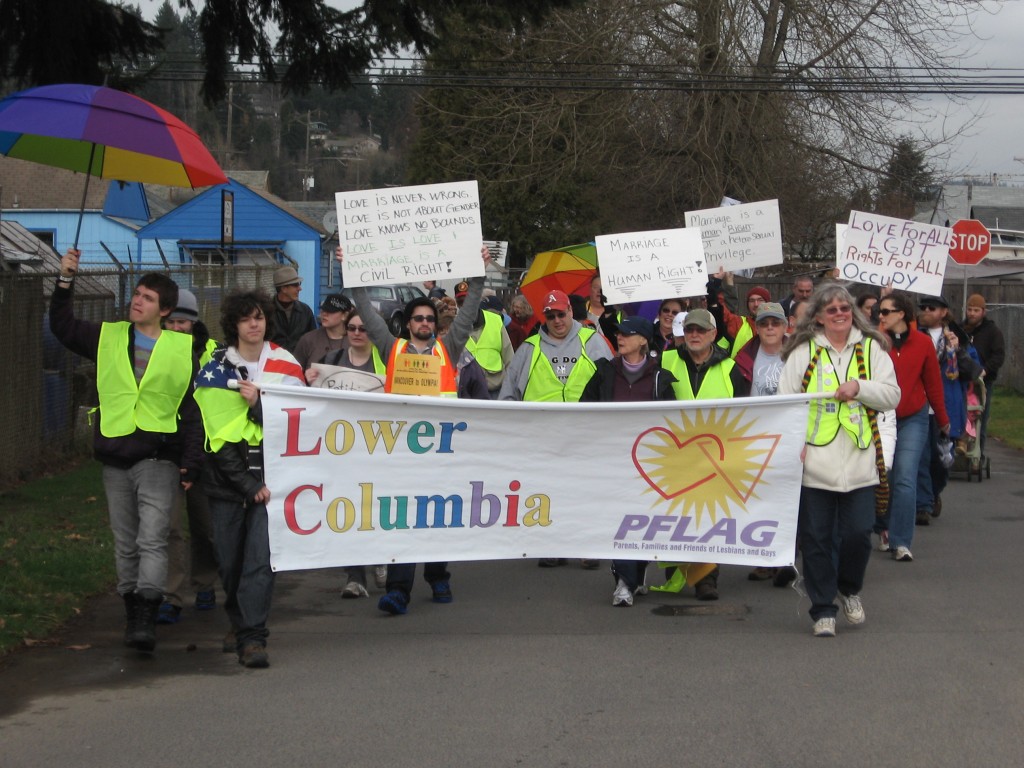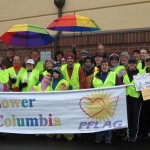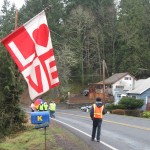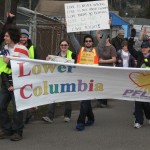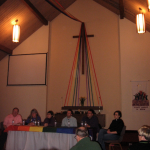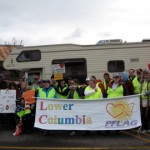When we began planning for the marriage equality march in June of last year, my initial burst of enthusiasm was occasionally dampened by doubts. Who would ever want to march in the rain and cold of a Washington February? How are we ever going to find enough marchers to cover more than 100 miles? Is this something that would even interest other faith communities and organizations? If I have learned one thing from this march, it is the power of a conversation. It is this lesson that I think has a lot to teach us in the coming months as we prepare to face the likely referendum that will challenge the new marriage equality law. I would even go so far as to say that the march is a model for what needs to happen next. Let me explain by first telling the story of what happened…
The Story
Nearly three years ago our church watched a movie called “The Asphalt Gospel.” This documentary follows six people who march 2,500 miles from Phoenix, Arizona to Washington D.C. to challenge narrow-minded and abusive religion from a progressive Christian perspective. For many of us who watched the film, the most powerful parts were the encounters that the marchers had with rural communities that had never been exposed to a brand of Christianity that unconditionally embraced LGBT persons. In discussing the movie afterward, an idea arose in a conversation between three people: what if we were to do our own march? What if our church were to march from Vancouver to Seattle in support of marriage equality? That seemed a lot easier than walking across the country.
Fast forward to June of last year: The idea of a march for marriage equality resurfaced in conversations about how our church would celebrate the 20th anniversary of our congregation’s vote to become an open and affirming church that welcomed gay and lesbian persons through our doors. By this point, we had arrived at the more realistic aspiration of marching 100 miles north to the state capitol of Olympia. Shortly thereafter, what was a conversation among a small group of people in our church quickly expanded into a larger conversation with leaders from organizations like the Community of Welcoming Congregations, Equal Rights Washington, and the Religious Coalition for Equality. A new idea arose from these discussions: we should invite others from outside our church to join us on the march. With the backing of our newfound sponsors, we began to expand the conversation even further in whatever way we could. We passed out hundreds of flyers at Vancouver’s annual pride festival. We invited other faith communities and organizations to join us. We made announcements at all sorts of meetings and events. At times, we struck out, but at other times, we were able to continue adding to our numbers.
Today, as we marched into Longview, we saw the fruits of this expanding conversation. Three Longview churches participated along with the Lower Columbia PFLAG chapter, a high school gay-straight alliance group, and Occupy Longview. We were a colorful group with signs, banners, and rainbow umbrellas. As we then marched down the main thoroughfairs of the city, something truly remarkable happened. We received a reception from those in the cars passing us by that warmed our hearts and lifted our spirits. They honked, waived, and cheered. They let us know that they supported marriage equality.
After a welcome gathering by local church folk at the county fair grounds and a potluck that filled the fellowship hall of Longview United Methodist Church, we had a community forum at which we discussed marriage equality and what we could do to make sure it withstood the challenges to come. As panelist Cory Saum-Blystone remarked, it was hard to believe all of this was happening in Longview, a city that does not have a liberal reputation.
The Call
As I listened to the Rev. Tara Wilkins speak at the forum, I realized that our march embodied exactly what supporters of marriage equality are going to be called to do in the coming months. We are going to be called upon to expand the conversation. We are going to be called upon to talk with our friends, co-workers, family, and neighbors about why marriage equality is important and why we are supporting it. We are going to be called upon to share our story of how we came to be passionate advocates for the right to marry. In our conversations, we may at times strike out, but if we persist in our efforts, our numbers will grow and marriage equality will survive whatever challenges may come.
I love looking at the pictures from our march today. They are full of color and promise. Ultimately, they show just how powerful a conversation can be.
